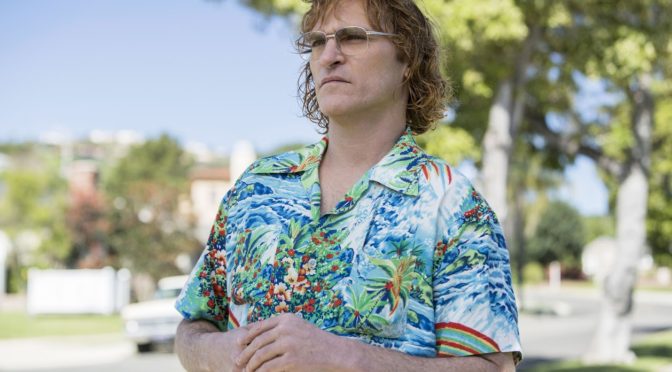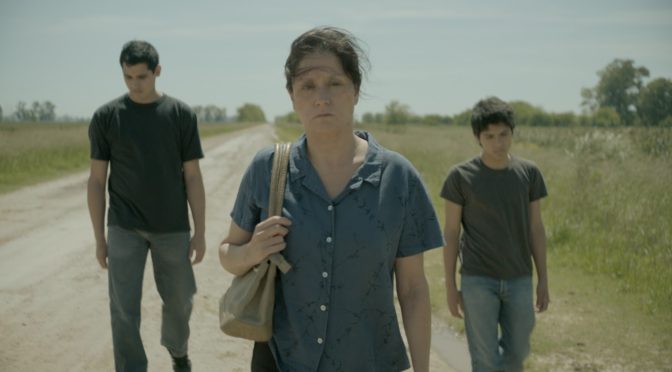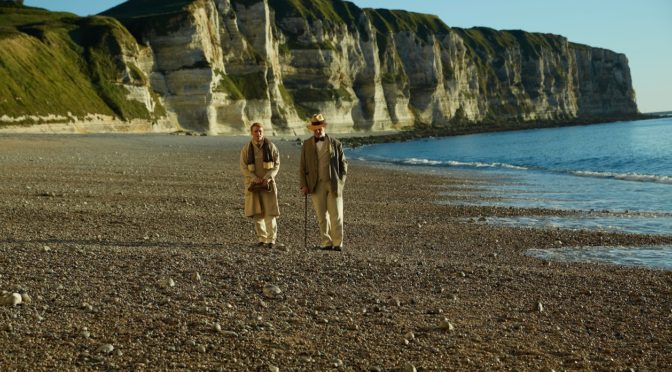We’re getting steamy on Sunday with some of our most sensuous TEDDY films this year! From the neon-paint-smeared bodies of ‘Tinta Bruta’, to trans MC, Lynn da Quebrada’s seductive stage performances, through to the wonderfully empowering female-thrusting of the ‘Juck’ dance, today’s selection celebrates sexuality in all its forms. Let loose your animal instinct with this feast of lusty cinema.
L’ Animale
Director: Katharina Mückstein
Austria, 2018, 97′, German
Screening: 19.00, Zoo Palast 1

In Austria the final school exam is known as the ‘Matura’. Unlike the German word ‘Abitur’ (from the Latin ‘abire’ meaning ‘to walk away’), the Austrian term also includes the notion of coming of age. Mati wants to become a veterinary doctor, like her mother, and therefore leave the confines of her small-town universe for Vienna. But is she ready for this future? Standing in her ‘Matura’ dress with her long hair scraped back into a tight bun and her neck hair shaved bare, she’d be the first to admit she looks like a clown. Mati loves to spend time with the boys bombing around the quarry on her motocross bike. When one of the girls from her school resists when one of Mati’s mates begins sexually harassing her at a disco, Mati spits in her face. But, just like her parent’s marriage, Mati’s motocross gang also ruptures once notions of friendship, love and sexuality become more pressing. In her second feature-length drama, Katharina Mueckstein uses clear words and images and cool synthesiser beats to tell the story of an inscrutable young woman on the brink of ‘walking away’. Her parents’ silence tells us that being mature and facing up to the future doesn’t have anything to do with your age.
Bixa Travesty (Tranny Fag)
Director: Claudia Priscilla, Kiko Goifman
Brazil 2018, 75′, Portuguese
Screening: 20.00, CineStar 7

Linn da Quebrada is a black transwoman from impoverished periurban São Paulo; she is also a pop performer who raises her voice for queers of colour from the favelas. Accompanied by her childhood friend and partner in crime, black transwoman and singer Jup do Bairro, her concerts are nothing short of dazzling. Aided by exorbitant costumes and plenty of twerking, her performances are onslaughts of electro against Brazil’s white heteronormative gender order and the machismo of the country’s funk scene. Private moments reveal her gentler side: as she showers with friends or cooks with her mother the talk turns to love, racism and poverty. Archive footage in the shape of home videos shows her in intimate performances at a hospital during her own cancer treatment. We begin to realise that Linn uses radical nudity as a means to undermine accepted gender roles. This documentary also shows her in dramatised radio interviews in which she powerfully espouses her convictions about feminism and her transsexuality: not for Linn the role of a cis woman; she’d rather be a woman with a penis whose gender identity is not bound by her genitalia but is in a permanent state of flux.
Der Himmel auf Erden (Heaven on Earth)
Director: Reinhold Schünzel, Alfred Schirokauer
Germany 1927, 113′, German intertitles
Screening: 19.30, CinemaxX 8

Local representative Traugott Bellmann is a vocal critic of society’s moral decline in general and the notorious nightclub “Heaven on Earth” in particular. Just his luck that he inherits the place – along with half a million marks – and furthermore, on the day, of all days, that he is appointed president of the Moral Decency League! And just his luck that the terms of the inheritance from his deceased brother stipulate that Bellmann has to spend every night from ten to three in the morning in his newly-acquired “den of iniquity”. Adding to the just his luck scenario is the fact that it all happens on Bellmann’s wedding day, with the daughter of a respectably champagne bottler waiting for her bridegroom in the bedroom … Shimmy, jazz, and Ziegfeld-style girl revues. With risqué innuendo and effervescent humour, the film turns elements of urbane entertainment into an attack on the 1926 obscenity law. At the same time, it celebrates cinema as a circus medium by elevating small artistes to large presences. Doors slam in the style of Ernst Lubitsch, while star Reinhold Schünzel, who would later direct Viktor and Viktoria, gives us a chic female impersonator as a jazz age gender bend.
Juck
Director: Olivia Kastebring, Julia Gumpert, Ulrika Bandeira
Sweden, 2018, 18′, Swedish
Screening: 15.30, CinemaxX 3

Juck is sex. Juck is energy. Juck is protest. Juck is therapy. Juck is action. Juck is dominance. Juck is provocation. Juck is tolerance. Juck is movement. Juck is fantasy. Juck is arousal. Juck is utopia. Juck is seeing one’s self, even if it’s tough. Juck is not apologizing for existing. ‘Femininity is a word that we can fill up with whatever we want,’ they say. They fill it up with Juck.
Mes provinciales (A Paris Education)
Director: Jean Paul Civeyrac
France, 2018, 136′, French
Screening: 19.00, Kino International

Filled with expectations, Etienne moves to Paris from Lyon to study film directing at the Sorbonne. He leaves behind his girlfriend Lucie, promising to call her regularly via Skype. On his course he meets Jean-Noël and Mathias, they too have come to the metropolis from smaller cities and share his passion for cinema. Together they discuss the cinematic canon, read texts by Flaubert and Pasolini, and listen to Bach and Mahler. Jean-Noël proves to be an agreeable friend who tries to strengthen Etienne’s fragile self-confidence; Mathias, on the other hand, often comes across as stern, aloof and mysterious. Fond of arguing, he has a habit of disappearing for weeks on end without the others knowing where he is. Nobody gets to see his student film, either. Etienne is particularly crestfallen when he discovers by chance that Mathias shares a secret with Annabelle, an idealistic young woman who lives in Etienne’s shared flat and with whom he is secretly in love. Jean Paul Civeyrac’s tenderly melancholic black-and-white study of these young people’s encounter with art and life is at the same time a declaration of love for classic cinema and the city of Paris.
Onde o Verão Vai (episódios da juventude)/ Where the Summer Goes (chapters on youth)
Director: David Pinheiro Vicente
Portugal 2018 20′, Portuguese
Screening: 21.30, CinemaxX 3

The summer heat shimmers. A group of friends drives to the forest. Their bodies are packed tightly into the car, four on the backseat and two up front. The men kiss. In the woods they happen upon a snake. The snake coils itself around the young man’s foot. The girl holds it in her hands. Two men eat peaches. After the kiss, the day is over. The composition of the group in a picture frame recalls the early films of Asghar Farhadi, in which time and again the individual is also faced with the group. The staging of youth is modern and at the same time their gazes and gestures reference Baroque painting, without ever losing sight of the present day. In four chapters, 21- year-old David Vincente appropriates the beginning of all of the stories of the monotheistic religions and gives it a fresh interpretation. Reframing his-story.
Para Aduma (Red Cow)
Director: Tsivia Barkai Yacov
Israel, 2018, 90′, Hebrew
Screening: 17.00, Haus der Kulturen der Welt

‘How do you feel about intimate relations? Speak freely, don’t hold back.’ · ‘I think it’s the highest connection between two souls.’ Benny’s hair is as red as the fur of her devout father’s treasured calf – which he believes will bring salvation. But the 17-year-old feels as lonely and trapped as the calf in its enclosure. Benny’s mother died giving birth to her, and she grew up alone with her caring yet patriarchal father. He is a figure of authority and a mentor for many people in their Jerusalem religious community. Benny becomes increasingly critical of her father’s religious, utopian nationalism and then there’s Yael, the self-confident young woman who has set off a whirlwind of longing and emotions in her. Avigayil Koevary powerfully portrays the defiance and desire of a young woman in Tsivia Barkai Yacov’s debut feature film.
T.R.A.P
Director: Manque La Banca
Argentina, 2018, 16′, Spanish
Screening: 16.00, CinemaxX 5

A mystical place, an enchanted story: A group of knights, imported directly from the Middle Ages, go ashore on the banks of the Río De La Plata. They are searching for a grave where they wish to perform a ritual. As they pass through the jungle, things happen that cause them to land in the present day. They have sex, find a car, enjoy a sunset with beers in their hands. Then an announcement comes over the radio that makes everything appear in a different light, and there’s no going back. This past summer demonstrations took place in southern Argentina against the Italian fashion and textile company Benetton. The company owns enormous tracts of land there that originally belonged to the Mapuche people. The indigenous Mapuche have been trying to get their property back for years in order to live in a self-determined manner. The protests were associated with excesses on both sides; Santiago Maldonado, who demonstrated with the Mapuche, disappeared in their midst. “Never again” was the widespread sentiment at the end of the dictatorship in Argentina, now the old threat seems to be looming again. There is no escape from reality – one has to face up to it. The filmmaker breaks open prevalent stereotypes in order to tell his own story free of hegemonial interference.
Three Centimetres
Director: Lara Zeidan
Great Britain, 2017, 9′, Arabic
Screening: 15.30, CinemaxX 3

A moment of floating, standstill. Four girlfriends are sitting in the gondola of a Ferris wheel. The camera takes in the view of the Mediterranean sea on the Lebanese coast, watches the girls boarding the gondola, turns a round with them, rides up to the very top. Then, the wheel suddenly comes to a halt and so does the camera. Their conversation has just comes to an abrupt end when Manal confesses that she has a girlfriend.
Tinta Bruta (Hard Paint)
Director: Marcio Reolon, Filipe Matzembacher
Brazil, 2018, 118′, Portuguese
Screening: 22.30, CinemaxX 7

Pedro earns a living in chat rooms. The image resolution may not be perfect but when Pedro transforms himself into NeonBoy in
front of the webcam he still manages to create the desired impression. Slowly, this young man dips his fingers into pots of coloured paint and glides them across his naked body. Glowing in the dark, NeonBoy follows his users’ commands until he agrees to meet
one of them in a private chat room for money. But things change when Pedro’s sister Luzia moves out of their shared apartment and he notices that somebody is imitating his performances. He agrees to go on a date with his mysterious rival. This rendezvous will
have far-reaching consequences. As with all of the previous films by directing duo Filipe Matzembacher and Marcio Reolon, we find ourselves again in Porto Alegre in northern Brazil, where we encounter young queers in search of intimacy, community and security. The elegantly interwoven virtual images and protagonists’ stories may take us away from the real world, yet in actuality we remain in an increasingly homophobic Brazilian society to whose misfits this sensitive, affectionate portrait in three acts is dedicated.





